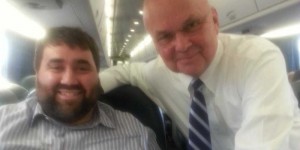Loose lips can sink ships but they can also cause lost dollars! Journalists as well as your adversaries love finding and overhearing your misplaced information.
Back in 2013, you may recall, a traveler on an Amtrak train was seated near former CIA director, Michael Hayden. The traveler was Tom Matzzie, a political strategist who used to run the D.C. branch of MoveOn.org.
Unbeknownst to Mr. Hayden, Tom Matzzie was eavesdropping and tweeting everything he overheard. Later he got up the courage to ask Mr. Hayden for a selfie.
A similar lesson was learned recently from a case heard by one of France’s financial regulators, reported in Bloomberg by columnist David Fickling.
Lazard Ltd. dealmaker Vincent Le Stradic spent two and a half hours aboard a Eurostar train from London to Paris working on a $15 billion takeover bid by Iliad SA for T-Mobile US Inc. He was oblivious to the fact that the casually dressed man sitting next to him was Alexandre Zaluski, a UBS Group AG banker, who passed the information to a colleague, ultimately resulting in the bank pitching to Iliad to help finance the deal.
That feels like a rookie mistake for Le Stradic. Client information, particularly related to multi-billion dollar offers for listed companies, should be sacrosanct to any investment banker. The train should be a place to catch up on admin, or get some sleep, or read a book. It shouldn’t be a place to do confidential work, especially not if you’ve got nosy neighbors.
In truth, the situation is a good deal less clear-cut. With those notorious 100-hour work weeks, investment bankers are under constant pressure to be at their clients’ beck and call, especially (as in the Iliad case) two weeks out from a major deal announcement. A financial adviser who habitually goes silent for hours at a time outside the office may find their clients prefer to work with someone more responsive.
Like spies, circumspect bankers ought to be highly aware of who’s around if they choose to do business in public – but slip-ups still seem inevitable. Journalists would be in trouble if bankers’ and government officials’ operations security was as rigorous as they’d like to think.

- This columnist once got a tip from finding bound and printed pre-IPO documentation lying abandoned on his street.
- A New York Times journalist got a major scoop on the Mueller inquiry in 2017 when he found himself at a table adjacent to members of President Donald Trump’s legal team at a Washington steakhouse.
- An officer for British spy agency MI6 once left a laptop carrying classified information in a taxi after a night out drinking in a London tapas bar, one of a string of similar incidents in the country.
Read more at Bloomberg
Trains, planes, buses, restaurants, or just on the street- keep your conversations private!

